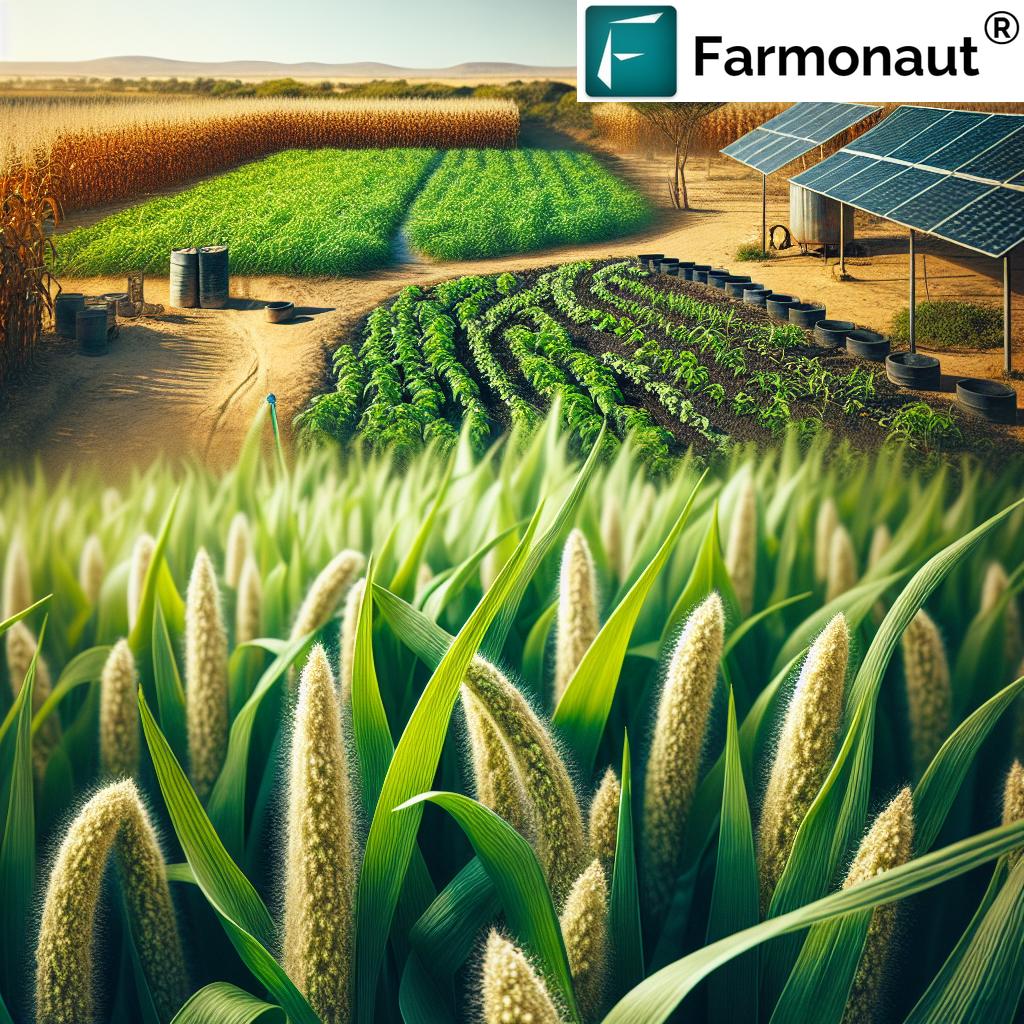Revolutionizing Sustainable Agriculture: Heat-Tolerant Wheat Boosts Food Security in Senegal Basin
“Heat-tolerant durum wheat in Senegal Basin thrives at temperatures up to 40°C and matures in just 90 days.”
In the face of global climate change and increasing food security challenges, we are witnessing a remarkable agricultural revolution in the Senegal Basin. This groundbreaking project combines sustainable agriculture practices with cutting-edge research on climate-resilient crops, offering a beacon of hope for smallholder farmers and communities across Africa. At Farmonaut, we’re excited to explore this innovative approach that’s transforming the agricultural landscape and boosting food security in one of the world’s most vulnerable regions.
The Power of Heat-Tolerant Wheat: A Game-Changer for African Agriculture
The introduction of heat-tolerant durum wheat varieties in the Senegal Basin marks a significant milestone in agricultural innovation for smallholder farmers. This breakthrough allows wheat cultivation in extreme climates, thriving at temperatures up to 40°C and maturing in just 90 days. Such resilience opens up new possibilities for crop diversification in Africa, potentially increasing food production and protein intake while offering fresh economic opportunities for local communities.

This agritech breakthrough is not just about introducing a new crop; it’s about reimagining agriculture in a region traditionally dominated by rice cultivation. By utilizing fallow land between rice seasons, this innovation addresses critical issues of malnutrition and poverty in Senegal, Mauritania, and Mali. The project’s impact extends far beyond the immediate agricultural benefits, touching on aspects of economic growth, food security, and sustainable development.
Understanding the Senegal Basin: A Unique Agricultural Landscape
The Senegal Basin, spanning across Senegal, Mauritania, and Mali, presents a complex and challenging environment for agriculture. Characterized by its hot, arid climate and seasonal flooding from the Senegal River, this region has historically relied heavily on rice cultivation. However, the introduction of heat-tolerant wheat varieties is revolutionizing land use and agricultural practices in this area.
- Climate challenges: Extreme temperatures and unpredictable rainfall patterns
- Soil conditions: Varying from sandy to clay-rich, often nutrient-poor
- Water resources: Dependent on the Senegal River for irrigation
- Traditional crops: Rice as the primary staple, with limited crop diversity
The unique conditions of the Senegal Basin make it an ideal testing ground for climate-resilient crops. The success of heat-tolerant wheat here could pave the way for similar innovations in other challenging agricultural environments across Africa and beyond.
The Science Behind Heat-Tolerant Wheat
The development of heat-tolerant wheat varieties is a testament to the power of modern agricultural research and international collaboration. This innovative crop is the result of years of dedicated work by scientists, combining traditional breeding techniques with advanced genetic research.
“The innovative wheat cultivation project impacts three countries: Senegal, Mauritania, and Mali, addressing malnutrition and poverty.”
Key Features of Heat-Tolerant Wheat:
- Temperature resilience: Thrives in temperatures up to 40°C
- Rapid maturation: Completes its growth cycle in just 90 days
- Water efficiency: Requires less water compared to traditional wheat varieties
- Nutritional value: High protein content, contributing to improved nutrition
The development of these wheat varieties involved extensive gene bank research, drawing on the genetic diversity of wheat from around the world. Scientists identified and combined traits that allow the wheat to withstand high temperatures, mature quickly, and produce good yields under challenging conditions.
Comparative Analysis: Heat-Tolerant Wheat vs. Traditional Wheat
To fully appreciate the impact of this agricultural innovation, let’s compare the heat-tolerant wheat varieties with traditional wheat:
| Characteristics | Heat-Tolerant Wheat | Traditional Wheat | Benefits for Senegal Basin |
|---|---|---|---|
| Maximum temperature tolerance | Up to 40°C | Up to 25-30°C | Enables cultivation in hotter climates |
| Cultivation period | 90 days | 120-150 days | Allows multiple cropping cycles per year |
| Estimated yield per hectare | 3-4 tons | 2-3 tons | Increased food production |
| Protein content | 13-15% | 10-12% | Improved nutritional value |
| Drought resistance | High | Moderate | Better resilience to water scarcity |
| Economic impact | 30-40% income increase | Baseline | Enhanced farmer livelihoods |
| Food security impact | 20-25% increase in local food availability | Baseline | Reduced dependence on imports |
This comparison clearly illustrates the significant advantages of heat-tolerant wheat for the Senegal Basin region. Its ability to thrive in harsh conditions while providing higher yields and nutritional content makes it a powerful tool in the fight against food insecurity and poverty.
Impact on Smallholder Farmers and Local Communities
The introduction of heat-tolerant wheat varieties is having a profound impact on smallholder farmers and local communities in the Senegal Basin. This agricultural innovation is not just changing what farmers grow; it’s transforming their entire approach to agriculture and their economic prospects.
- Diversified income streams: Farmers can now grow wheat in addition to traditional crops
- Improved food security: Local production of wheat reduces dependence on imports
- Enhanced nutrition: Higher protein content in wheat contributes to better diets
- Skill development: Farmers learn new cultivation techniques and crop management practices
- Economic empowerment: Increased yields and market opportunities boost farmer incomes

At Farmonaut, we recognize the importance of supporting smallholder farmers in adopting new agricultural practices. Our satellite-based farm management solutions can play a crucial role in helping farmers maximize the benefits of heat-tolerant wheat cultivation. By providing real-time crop health monitoring and AI-based advisory systems, we empower farmers to make informed decisions and optimize their yields.
Explore Farmonaut’s innovative agricultural solutions:
Environmental Sustainability and Climate Resilience
The heat-tolerant wheat project in the Senegal Basin is not just about increasing food production; it’s a prime example of sustainable agriculture in action. This innovative approach addresses several key environmental challenges while enhancing climate resilience:
- Water conservation: Heat-tolerant wheat requires less water than traditional crops
- Soil health: Crop rotation with wheat can improve soil structure and fertility
- Biodiversity: Introducing new crops increases agricultural biodiversity
- Carbon footprint: Local production reduces the need for long-distance food transportation
- Climate adaptation: Heat-tolerant varieties are better equipped to withstand changing climate conditions
At Farmonaut, we’re committed to promoting sustainable agricultural practices. Our satellite-based monitoring systems can help track the environmental impact of new crop varieties and farming methods, ensuring that agricultural innovations like heat-tolerant wheat contribute positively to overall ecosystem health.
International Collaboration and Knowledge Sharing
The success of the heat-tolerant wheat project in the Senegal Basin is a testament to the power of international collaboration and free knowledge-sharing in agricultural research. This initiative brings together scientists, researchers, and agricultural experts from around the world, fostering a spirit of cooperation that transcends borders.
Key aspects of this collaborative approach include:
- Gene bank research: Accessing diverse wheat genetic resources from global collections
- Cross-border partnerships: Collaboration between African countries and international research institutions
- Open-source knowledge: Sharing research findings and best practices freely among participating countries
- Capacity building: Training local scientists and farmers in new agricultural techniques
- Industry engagement: Fostering partnerships with North African pasta industries for market development
This collaborative model not only accelerates agricultural innovation but also ensures that the benefits of research are widely shared, particularly with those who need it most – smallholder farmers in developing regions.
Future Prospects and Scaling Up
The success of heat-tolerant wheat in the Senegal Basin opens up exciting possibilities for the future of agriculture in Africa and beyond. As we look ahead, several key areas show promise for further development and scaling up:
- Expanding to new regions: Adapting the heat-tolerant wheat varieties for other hot, arid areas in Africa and Asia
- Crop diversification: Applying similar research techniques to develop heat-tolerant varieties of other staple crops
- Market development: Creating new value chains and market opportunities for wheat products in West Africa
- Technology integration: Incorporating precision agriculture techniques to further optimize wheat cultivation
- Policy support: Advocating for policies that support sustainable agriculture and smallholder farmers
At Farmonaut, we’re excited about the potential of combining our satellite-based agricultural solutions with these innovative crop varieties. Our technology can help farmers and researchers monitor crop performance, optimize resource use, and scale up successful agricultural practices across diverse regions.
Discover how Farmonaut’s API can enhance your agricultural projects: Farmonaut API
For developers interested in integrating our solutions: API Developer Docs
Challenges and Considerations
While the heat-tolerant wheat project in the Senegal Basin has shown remarkable success, it’s important to address the challenges and considerations for its long-term sustainability:
- Water management: Ensuring sustainable water use in a region prone to water scarcity
- Seed distribution: Developing efficient systems for distributing high-quality seeds to smallholder farmers
- Market infrastructure: Building local and regional markets for wheat products
- Pest and disease management: Monitoring and addressing potential new pest or disease issues
- Capacity building: Continuous training and support for farmers adopting new crop varieties
- Climate variability: Preparing for potential shifts in climate patterns that may affect wheat cultivation
Addressing these challenges requires ongoing research, investment in infrastructure, and strong partnerships between farmers, researchers, governments, and private sector entities.
The Role of Technology in Sustainable Agriculture
As we embrace innovations like heat-tolerant wheat, it’s crucial to recognize the role of technology in supporting sustainable agriculture. At Farmonaut, we’re at the forefront of integrating advanced technology into farming practices:
- Satellite imagery for crop monitoring
- AI-driven advisory systems for precision farming
- Blockchain technology for supply chain transparency
- Data analytics for optimizing resource use
These technological solutions can significantly enhance the success of agricultural innovations like heat-tolerant wheat, providing farmers with the tools they need to maximize yields while minimizing environmental impact.
Conclusion: A Sustainable Future for African Agriculture
The heat-tolerant wheat project in the Senegal Basin represents a significant step forward in sustainable agriculture and food security solutions. By combining innovative crop varieties with smart farming practices and technology, we’re opening up new possibilities for smallholder farmers facing the challenges of climate change.
This project demonstrates the power of agricultural innovation to address critical issues of food security, nutrition, and economic development. As we continue to face global challenges in agriculture, initiatives like this provide a blueprint for creating resilient, sustainable food systems that can thrive in even the most challenging environments.
At Farmonaut, we’re committed to supporting these innovative agricultural practices through our advanced satellite-based farm management solutions. By combining cutting-edge crop varieties with precision agriculture technology, we can help farmers around the world achieve greater productivity, sustainability, and prosperity.
FAQs
- Q: What makes heat-tolerant wheat different from traditional wheat varieties?
A: Heat-tolerant wheat can thrive in temperatures up to 40°C, matures in just 90 days, and requires less water than traditional varieties, making it ideal for hot, arid climates. - Q: How does this project impact food security in the Senegal Basin?
A: By introducing a new staple crop that can be grown between rice seasons, the project increases local food production, diversifies diets, and reduces dependence on imports. - Q: Can heat-tolerant wheat be grown in other regions?
A: Yes, while currently focused on the Senegal Basin, this wheat variety has potential for cultivation in other hot, arid regions facing similar climate challenges. - Q: How does this project contribute to sustainable agriculture?
A: The project promotes water conservation, improves soil health through crop rotation, and enhances climate resilience, all key aspects of sustainable agriculture. - Q: What role does technology play in this agricultural innovation?
A: Technology, such as Farmonaut’s satellite-based solutions, plays a crucial role in monitoring crop health, optimizing resource use, and providing farmers with data-driven insights for better decision-making.















